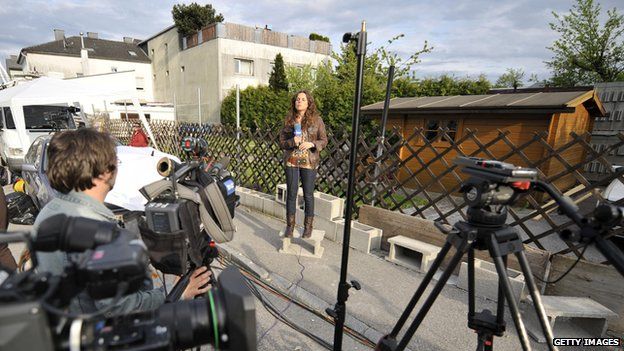Twitter abuse: Women journalists get more threats
- Published

A senior official from the European security body, the OSCE has warned of a growing number of online threats faced by women journalists.
Following her reports on the protests at Istanbul's Gezi Park in 2013, Turkish journalist Amberin Zaman was fiercely attacked on Twitter.
The messages were abusive, violent and sexual, she said.
"I received hundreds of tweets, using the most obscene language, threatening to kill me, threatening to rape me."
She said some threatened "to make me sit on a broken wine bottle".
She is Turkey correspondent for the Economist and a columnist for the Turkish daily Taraf.
After reporting on the Charlie Hebdo massacre in Paris last month Ms Zaman experienced another mass attack on Twitter.
"It's like a public lynching," she said. "It has made me frightened for my physical safety when I am out in the streets."
She is not alone.
Online abuse against women journalists is "a global phenomenon growing at a very rapid pace" according to Dunja Mijatovic, the OSCE's Representative on the Freedom of the Media.
She says she is "alarmed" at how female journalists and bloggers are singled out and attacked in social media, where people can hide behind anonymity.
"The female journalists targeted most report on crime, politics and sensitive - and sometimes painful - issues, including taboos and dogmas in our societies," Ms Mijatovic says.
"These online attacks tend not to address the content of the articles but instead degrade the journalist as a woman."
The OSCE says online threats of rape and sexual violence have become "part of everyday life" for some female journalists. Others, it says, experience "severe sexual harassment and intimidation".
Ms Mijatovic says "in some countries like the UK, the US and in Scandinavia, the problem is acknowledged… In other countries [it] remains a non-issue."
The abuse is a "dangerous new trend, which needs to be addressed now," she says.
The Swedish TV anchor Jenny Alversjo, who works for TV4 Sweden, agrees that things have changed.
"For almost 20 years, I have worked as a journalist and I have always been a target for other people's opinions," she told me by email. "I guess part of it comes with the job."
But she says "four or five years ago something changed and the tone became much more aggressive and threatening."
She received death threats.
"When someone threatens to kill you… the world stops," she said. "The first real threat was horrifying. The person who wanted me dead said I had two weeks left to live. It's hard to describe the fear I felt."
However both Jenny Alversjo and Amberin Zaman say they are determined not to let the internet trolls win.
"First you're scared, but soon the fear turns into anger," Ms Alversjo says.
"No one has the right do this to me. No one can keep me from doing my job.
"If someone can scare me to silence we have a huge democratic problem and I refuse to be a part of that."
- Published5 February 2015
- Published27 July 2013
- Published18 September 2014
- Published27 November 2014